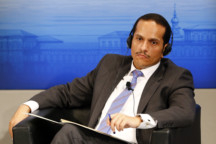
Manama: The Syrian regime’s unprecedented brutality and the failure of the international community to protect civilians from massive bombardment have led to the militarisation of the civil revolution, Qatar’s foreign ministry has said.
“They also resulted in the mounting influence of foreign groups that took advantage of the power vacuum and controlled lands in both Syria and Iraq,” Shaikh Mohammad Bin Abdul Rahman Al Thani said.
“The historic coexistence of different religions and ethnic groups enrich our culture and society, but the politicisation of sectarian differences is a recent phenomenon that has unfortunately been used and reproduced by regional and international powers and encouraged by the existing competition between countries,” he said at a session of the 52nd Munich Security Conference under the title of ‘Growing Rifts, Power Shifts? The New Geopolitics of the Middle East’.
Shaikh Mohammad, who was given the foreign affairs portfolio last month in a massive cabinet reshuffle, said that understanding the new geopolitics of the Middle East required raising the question as to how the Middle East and North Africa region changed from an era of possible political reform to an era of conflicts and disputes.
Considering the issue from the population perspective, more than six per cent of the world’s population live in the Middle East.
“This figure includes Muslims and Christians, Arabs and Kurds, and 57.6 million people are in need of humanitarian aid, including 17.7 million people who are either internally displaced or refugees fleeing conflict and persecution,” the minister said, quoted by Qatar News Agency (QNA).
Shaikh Mohammad reiterated in his speech the importance of discussing the balance of power at a time of mounting tensions between regional actors, and stressed that the most urgent matter to discuss was the fate of millions of families and communities living under oppression in the Middle East.
He added that the region was already reeling from the overwhelming impact of major factors for instability, namely, continuing escalation, the siege against the Palestinian people, the absence of a just solution and the loss of hope for any corrective step by the international community to end one of the last remaining occupations in the world, in itself a factor of instability in the Middle East.
He said the region was undergoing massive violations of human rights, chaos and instability that created a favourable environment for all kinds of destructive interests, including terror organisations that found fertile ground among the frustrated and disadvantaged groups.











